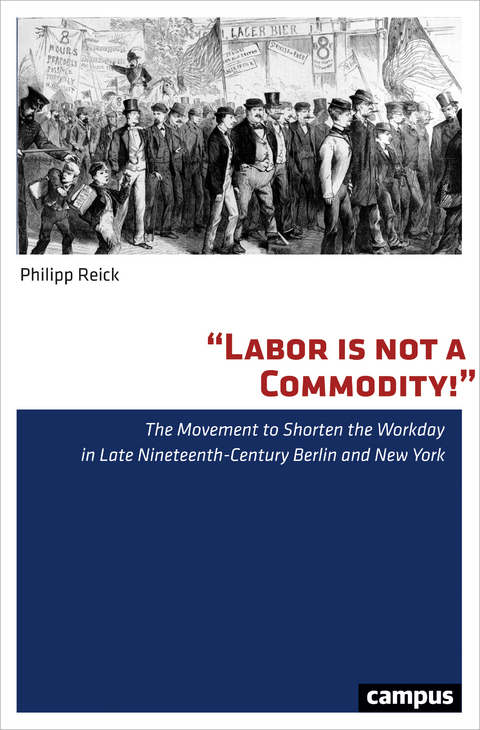
Labor is not a Commodity!
Campus (Verlag)
978-3-593-50627-2 (ISBN)
Philipp Reick ist Fellow der Martin Buber Society an der Hebrew University in Jerusalem.
Contents
Acknowledgements 7
Preface 9
1.Introduction: Theory and Methods
1.1.The Polanyian Revival 18
1.2.The Conceptual Toolbox 21
1.3.The Comparative Approach 28
1.4.The Text Corpus38
1.5.The State of Research 40
2.Market: The Commodification of Work and the Birth of Organized Labor
2.1.The Rise of a Free Labor Market 45
2.2.Organized Labor in Berlin in the 1860s and early 1870s 55
2.3.Organized Labor in New York in the 1860s and early 1870s 67
3.Polity: Shorter Hours and the Struggle for Equality
3.1.The Movement for Shorter Hours in New York 79
3.2.The Movement for Shorter Hours in Berlin 88
3.3.Chapter Conclusion 101
4.Society: Shorter Hours and the Struggle for Human Rights
4.1.Commodification as Dehumanization 109
4.2.De-Commodification as Counter-Hegemony 121
4.3.Chapter Conclusion 130
5.Economy: Shorter Hours and the Struggle for Redistribution
5.1.The Political Economy of Shorter Hours 135
5.2.The Decline of the Concept of Commodification 141
5.3.Chapter Conclusion 158
6.Gender: Shorter Hours and the Protection of Female Labor
6.1.Women's Work 165
6.2.Protecting Female Labor 176
6.3.Chapter Conclusion 196
7.Conclusion: The Past and Present of Commodification 202
Abbreviations 211
Bibliography 212
Index of Subjects 234
Index of Persons 236
Acknowledgements
Over the past three years, I have spent an enormous amount of time in front of microfilm readers in the basements and backrooms of libraries and archives. I am grateful to all the people who made this experience nevertheless a pleasant one. I thank the staff at Tamiment Library & Robert F. Wagner Labor Archives at New York University for providing an excellent atmosphere for archival research. I also would like to extend my gratitude to the archival staff at the International Institute of Social History in Amsterdam, the New York Public Library, the Center for Berlin Studies at the Berlin Central and Regional Library, the Library of the German Federal Archive in Berlin-Lichterfelde, and the Prussian Privy State Archives. I wish to thank Gabi Bodmeier, Katja Mertin, and David Bosold at the Graduate School of North American Studies, as well the entire team at the Library of the John F. Kennedy Institute at FU Berlin and Julia Mayer in particular, who is sadly missed. I also thank Daniel Moure García for his excellent copy-editing service. Research for this book has been funded by the Excellence Initiative of the German Research Foundation. The publication has been made possible by generous funding from the Ernst-Reuter-Stiftung, the FAZIT-Stiftung, and the Graduate School of North American Studies. Parts of Chapter 6 have been previously published in Vol. 6, No. 1 (2015) of "Interdisciplines: Journal of History and Sociolgy."
Many people have offered helpful criticisms and suggestions. In particular, I wish to thank M. Michaela Hampf, Thomas Welskopp, and Nancy Fraser, who supervised my dissertation project. In addition, I would like to express my gratitude to Andreas Etges, Gudrun Löhrer, and Victoria Tafferner, as well as the GSNAS class of 2011, for feedback during an early phase of this project. Many thanks go to Joshua B. Freeman for his support during my visiting scholarship at the CUNY Graduate Center. Finally, I am very grateful to John Connelly at UC Berkeley, who convinced me to become a historian in the first place. Important comments and criticism also came from friends who read parts of the manuscript. In particular, I wish to thank Nils Utermöhlen and Matthias Martin Becker, who first introduced me to Karl Polanyi's Great Transformation in a highly appreciated reading group. I also thank my brother Robert for his comments at a time when he was wrapping up his own dissertation in philosophy. Likewise, I thank my uncle Michael for his support. A very special thanks goes to Franziska Nadler for her healthy distrust of office chairs. To more than anyone else, I am grateful to my parents, who always supported my interest in what Germans call the "breadless arts." I dedicate this study to their memory.
Jerusalem, September 2016
Preface
The past three decades have witnessed an astonishing rebirth of market liberalism. Although it is hardly conceivable for present-day observers, the demand to deregulate markets revolutionized established notions of economic stability and social progress. After all, markets had been anything but free for decades. During Keynesian postwar prosperity, European and North American markets were embedded in a complex system of democratically legitimized control. Labor markets were regulated by protective legislation and strong welfare states; real-estate markets were restricted by public-housing programs; currency markets were governed by an international system of fixed exchange rates. Yet the paradigm of regulated markets dissolved quickly in the late 1970s due to its apparent inability to address the era's major challenge of stagflation. Heavily indebted to the liberal legacy of the nineteenth century, the neoliberal turn of the 1980s thus ended the intermezzo of market regulation. While this free-market renaissance was largely conceived of in the centers of political power across Western Europe and the US, its message was never confined to these regi
| Erscheinungsdatum | 05.11.2016 |
|---|---|
| Reihe/Serie | Nordamerikastudien ; 37 |
| Verlagsort | Frankfurt |
| Sprache | englisch |
| Maße | 142 x 215 mm |
| Gewicht | 306 g |
| Themenwelt | Sozialwissenschaften ► Politik / Verwaltung |
| Sozialwissenschaften ► Soziologie ► Allgemeine Soziologie | |
| Sozialwissenschaften ► Soziologie ► Spezielle Soziologien | |
| Schlagworte | Amerika • Arbeiter • Arbeiterbewegung • Arbeitskampf • Arbeitsschutz • Arbeitszeitverkürzung • Autonomie • Berlin • Deutschland • freier Markt • Gewerkschaften • Großstadt • Kaiserreich • Karl Polanyi • Kommodifizierung • Maskulinität • Mitbestimmung • New York • Proletariat • Sozialdemokratie • Sozialpolitik • Soziologie • Streik • Teilhabe • Trade Union • USA • Vereinigte Staaten |
| ISBN-10 | 3-593-50627-0 / 3593506270 |
| ISBN-13 | 978-3-593-50627-2 / 9783593506272 |
| Zustand | Neuware |
| Informationen gemäß Produktsicherheitsverordnung (GPSR) | |
| Haben Sie eine Frage zum Produkt? |
aus dem Bereich


